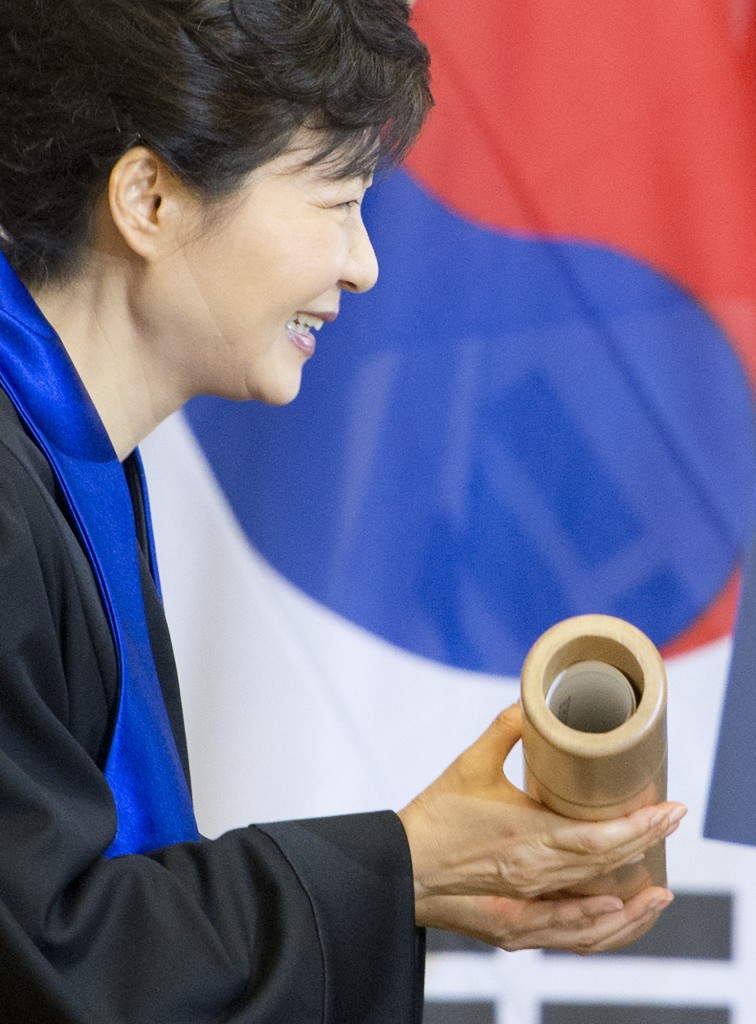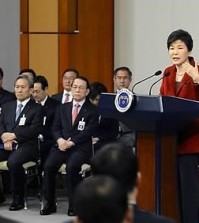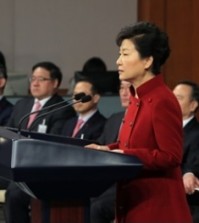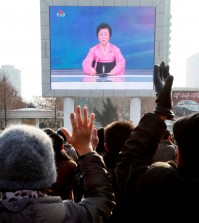- California Assembly OKs highest minimum wage in nation
- S. Korea unveils first graphic cigarette warnings
- US joins with South Korea, Japan in bid to deter North Korea
- LPGA golfer Chun In-gee finally back in action
- S. Korea won’t be top seed in final World Cup qualification round
- US men’s soccer misses 2nd straight Olympics
- US back on track in qualifying with 4-0 win over Guatemala
- High-intensity workout injuries spawn cottage industry
- CDC expands range of Zika mosquitoes into parts of Northeast
- Who knew? ‘The Walking Dead’ is helping families connect
Park offers NK massive aid
Dresden doctrine aims at persuading Pyongyang to act responsibly
By Kim Tae-gyu
DRESDEN, GERMANY ― President Park Geun-hye proposed a package of proposals to North Korea, Friday, including humanitarian aid and the establishment of a development bank as a step toward unification in what she called the “Dresden Doctrine.”

South Korean President Park Geun-hye holds the honorary doctorate document she received during a ceremony at the Dresden University of Technology in Dresden, Germany, Friday, March 28, 2014. (AP Photo/Jens Meyer)
In a speech in this former East German city, Park repeated her requests on Pyongyang’s denuclearization but she did not overtly tag the measure as a precondition necessary to initiate all the programs.
“Just as the German people secured freedom, prosperity and peace by tearing down the Berlin Wall, we too, must tear down barriers in our march toward a new future on the Korean Peninsula,” Park said in Dresden University of Technology after receiving an honorary doctorate.
“Now more than ever, South and North Korea must broaden their exchange and cooperation. What we need is not one-off or promotional events, but the kind of interaction and cooperation that enables ordinary South Koreans and North Koreans to recover a sense of common identity as they help each other.”
Park spelled out three key areas― “humanity, co-prosperity and integration” ―to lay the groundwork for a peaceful unification.
Included in action plans are the expansion of humanitarian aid including helping pregnant mothers and infants in the North, building multi-farming complexes that support agriculture, livestock and forestry, and investing in infrastructure projects in transportation and telecommunications.
She proposed that the two Koreas establish an “inter-Korean exchange and cooperation office” in their capitals to takes charge of the projects. Park also called for holding regular reunions of family members separated by the 1950-1953 Korean War.
The President did not clearly specify or stress North Korea’s denuclearization as a prerequisite for the three humanitarian and cooperative projects, but did so for financial aid on an international scale.
“Should North Korea make the strategic decision to forgo its nuclear program, South Korea would correspondingly be the first to offer its active support, including much needed membership in international financial institutions and attracting international investment,” she said.
“If deemed necessary, we can seek to create a Northeast Asia Development Bank with regional neighbors to spur economic development in North Korea and surrounding areas.”
Park also renewed her proposal to establish an international peace park in the Demilitarized Zone, a buffer zone separating the two Koreas, to help reduce cross-border tension.
Concluding her remarks, Park said in German: “Wir sind ein Volk” _ “We are one people.”
At the start of her second year in office, Park began stressing the significance of unification in terms of new business opportunities in a unified Korea. A “bonanza” was her expression for the expected benefits.
To achieve the goal, Seoul is poised to launch a dedicated committee next month headed by the President herself.
During a summit with Park this week, Chancellor Angela Merkel agreed with her, saying Germany hit a jackpot after the end of four-decades of division in 1990.
Park’s predecessors also opted to speak about unification during their visits to Germany, once the heart of the Cold War.
In particular, Dresden is the city where former German Chancellor Helmut Kohl gave a famous speech in 1989 at a Lutheran church to cement reunification of Germany.
The capital of the German state of Saxony had been demolished by days of carpet bombing in World War II, and failed to recover when it was part of East Germany in the latter part of the 20th century.
After reunification, however, the city racked up rapid growth thanks in no small part to an economic revitalization scheme. Currently, it houses factories and research labs of powerhouses Siemens, Volkswagen and Infineon.















